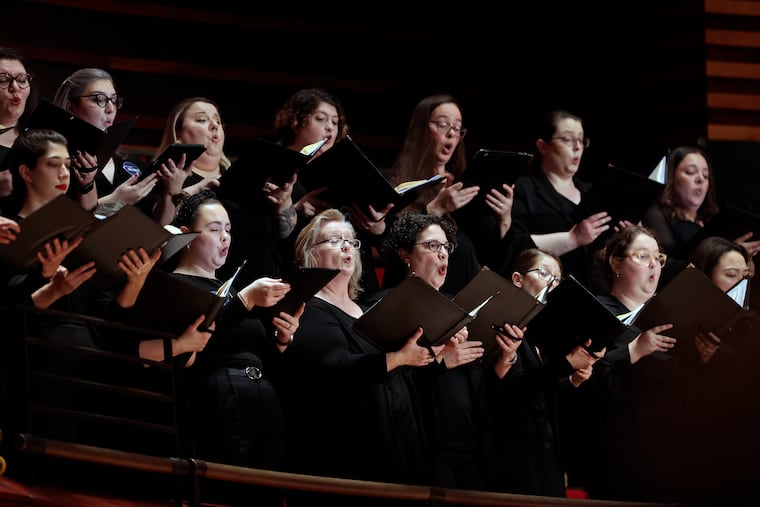The Philadelphia Orchestra’s Brahms ‘German Requiem’ may be a highpoint in the Yannick Nézet-Séguin era
Friday's concert also featured the world premiere of the "Nomad Concerto" by Mason Bates.

Might the world be a happier, more harmonious place if orchestras, instead of performing The Messiah every year, did Brahms’ A German Requiem instead? Religion in our age has grown more divisive, and though Brahms uses biblical texts for his requiem, the emphasis is on humanity — and the joy, comfort and reward in it.
There’s nothing to keep you from basking in this requiem’s beauty no matter who you are, much as the nonbeliever can stand in Notre Dame or Chartres and feel transformed by the light and aura. Art is like that. Its purpose hews only to the reasons of the individual experiencing it (or, if you prefer, no reason at all).
Aura is key to the Brahms, and if you’ve come to know the piece in recordings, you really do owe it to yourself to hear it live. It doesn’t come around often, and judging by Friday afternoon’s opening, the remaining performances by the Philadelphia Orchestra, Philadelphia Symphonic Choir and soloists will be quite special.
So strong was Friday’s Brahms that it created the sensation of fashioning its own world, a place far away and better. Yes, the performance, led by Yannick Nézet-Séguin, was slightly marred by a false start in one movement and some rote playing near the beginning. But when it found its point of view a little more than halfway in, the performance grew in sophistication and fire. It could well be one of the big statements of Nézet-Séguin’s tenure so far.
Spirituality was woven through all three pieces on the program. A violin concerto by Mason Bates, receiving its world premiere, follows a wanderer through different worlds, reflected in a succession of musical styles through which Bates moves beautifully. The Nomad Concerto broods, floats and glimmers in its opening movement, ultimately alighting on something poignant for both orchestra and violin, here played by the warmly expressive Gil Shaham.
Shades of the Walton Violin Concerto surface briefly in the first two movements, and Thai gongs and a Jewish melody are deployed in the third. Tense, driving jazz is less convincing inspiration for the fourth movement, but Bates in this new piece once again proves a composer unusually commanding of atmosphere and emotion.
Nézet-Séguin prefaced the Brahms with another, brief requiem: Oraison for chorus and orchestra by Canadian-Cuban composer Luis Ernesto Peña Laguna, written as a memorial to victims of the pandemic. The piece, commissioned by Nézet-Séguin’s Orchestre Métropolitain, arrives in swells. Gentle but powerful, it gives the impression of a roll of dark clouds continuously gathering and parting to reveal a radiant light.
Afterward, stagehands arrived to remove the conductor’s music stand, and Nézet-Séguin conducted the Brahms from memory. I like the fact that the text wasn’t supertitled, which made it even easier to focus on Brahms’ astonishing score. The turning point in the performance came in the fifth movement, with the entrance of soloist Jeanine De Bique. Perched near the choir, the soprano was smooth and secure while still conveying a wonderful sense of vulnerability.
(For those curious, the buttons worn by choir members said We Are AGMA, an expression of solidarity as they continue to negotiate a contract with the Philadelphia Orchestra and Kimmel Center, Inc. through their union, the American Guild of Musical Artists.)
Whether it was the soprano’s performance or some other force, from that point on, the emotion of the performance intensified. In the next movement, baritone Christopher Maltman and Nézet-Séguin’s tension ratcheted up a few degrees. The last movement arrived like a salve — made all the more rich by Holly Blake’s big contrabassoon foundation, Nézet-Séguin’s sweet and expressive phrasing, and the inner glow of winds and harps gently cradling the work to a close.
Additional performances: Saturday at 8 p.m. and Sunday at 2 p.m. in Verizon Hall, Broad and Spruce Streets. Tickets are $51-$181. A few $25 rush tickets may be available. philorch.org, 215-893-1999.